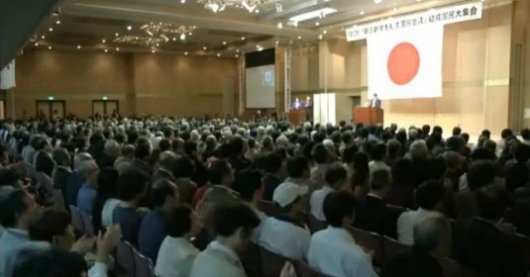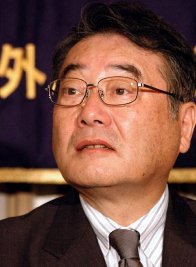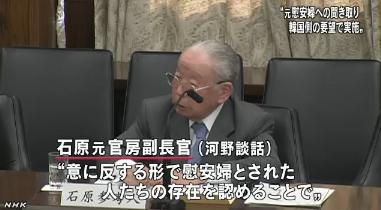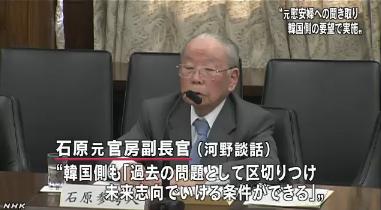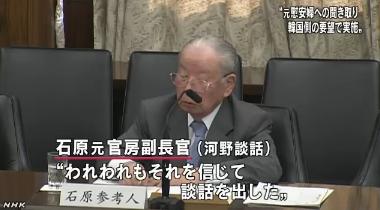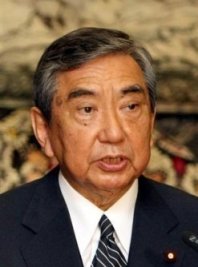
C O N T E N T S

Moguro Fukuzou
This year, there were many significant events that occurred on the issue of the comfort women including those shown below.
- January 1
- Sankei Shimbun carried an article that says gThe Kono Statement was produced as the result of collaboration between the governments of Japan and S. Korea.h gAccording to the internal documents the newspaper acquired from the Foreign Ministry, S. Korea intervened in the process of preparing the draft of the Statement and asked Japan to change about ten 10 wordings.h said the article.
- February 20
- Nobuo Ishihara, Deputy Chief Cabinet Secretary at the time 1993 Kono Statement was issued, appeared at the Diet and stated that the Japanese Militaryfs involvement mentioned in the Statement was based on the hearing of alleged former comfort womenfs witness accounts, not documents.
- April 2
- Sankei Shimbun reported that the hearing of witness accounts of 16 former comfort women had been conducted as a formality. gAccording to the internal documents of the Foreign Ministry, the hearing of 16 alleged former comfort women was conducted as a ceremony.h the article says, gIt was an alibi to show that there was forcible recruitment by the Japanese Military.h
On the same day, Nobuo Ishihara, former Deputy Chief Cabinet Secretary, reappeared at the Diet and stated as follows.
gS. Korea said, eBy admitting that there were women who worked at military frontline brothels against their will, S. Korea will put an end to this dispute as thing of the past and can create a future-oriented relationship with Japan.f We believed it and delivered the Kono Statement in a hope to attain the better relationship with S. Korea.h
- June 20
- The Panel Committee, formed for the purpose to examine the exchanges between the two governments of Japan and S. Korea leading up to the issuance of the Kono Statement, made a public release of its findings.
- August 5
- Asahi Shimbun admitted that the Seiji Yoshidafs testimony of round-up of Korean women and girls at Cheji Island was contradictory to the accounts of the people living in the Island and found the testimony unreliable, false statement. This Asahi Shimbunfs admittance of false reporting is important since Seiji Yoshidafs testimony was the only the offenderfs side of testimony that exists till today. Based on the findings, Asahi Shimbun retracted its past articles related to the Yoshida Testimony.
- September 11
- Tadakazu Kimura, President of Asahi Simbun, made a formal apology of its past misreporting on the Yoshida Testimony.
- October 30
- The ruling LDP party held a first meeting of the Special Committee to investigate the Asahi Simbunfs false reporting and the damage Japan incurred. The Special Committee required the Foreign Ministry to make an immediate public release of Japanfs rebuttal against the 1996 Coomaraswamy Report, which the Foreign Ministry retracted for unknown reasons.
This paper discusses how the Asahi Shimbun reported the past articles on the comfort women and repercussions such reporting has made in Japan and abroad.
Tomomi Inada, Chairperson of the LDP Policy Research Council, speaks to the Special Committee members on Oct.30. She insists that Japan should pay utmost efforts to restore the reputation with firm counterargument against baseless slander allegation.
More than 1,100 people attended at the gNational Assembly to Inquire the False Reporting of Asahi Shimbunh on October 26. If you consider they are all right wingers or extreme nationalists, you are underestimating our resolve on this matter.
Q: Why is the Kono Statement important?A: Because it is the ground of the US Lower House Resolution 121 passed in 2007.
The Japanese people are suffering from this FALSE ALLEGATION!
There was prostitution. There were comfort stations. Prostitution was completely legitimate business back then. However, they were not coerced, not forcibly abducted by the Japanese army or police. It was quite like American GIs had Korean prostitutes in the Korean War in 1950s and have Filipino prostitues in Iraq or Afganistan today.
The comfort women were not gSex Slavesh as often portrayed in the US media. They were highly-paid prostitutes/camp followers working at frontline brothels.
Read the wording of US House of Reps Resolution 121. It says "Japan should formally acknowledge, apologize, and accept historical responsibility in a clear and unequivocal manner for its Imperial Armed Forces' coercion of young women into sexual slavery, known to the world as "comfort women", during its colonial and wartime occupation of Asia and the Pacific Islands from the 1930s through the duration of World War II."
What is the shameless arrogant brazen statement you can throw at your ally!! It appears Americans have forgotten to have dropped two atomic bombs in Japan and committed genocide.
The Author cannot understand why the Americans poke their nose into everything in the world with only superficial scanty knowledge!
 |
Rep. Mike Honda, who pushed forward the U.S. Resolution 121, appeared on Japan's TV program and stated that the Kono Statement is the ground of Resolution 121. |
 |
US H.Res.121 says:
the Government of Japan should formally acknowledge, apologize, and accept historical responsibility in a clear and unequivocal manner for its Imperial Armed Forces' coercion of young women into sexual slavery, known to the world as "comfort women", during its colonial and wartime occupation of Asia and the Pacific Islands from the 1930s through the duration of World War II. |
| Mike Honda visits Comfort Woman Memorial built at Palisades Park, Fort Lee, New Jersey. | 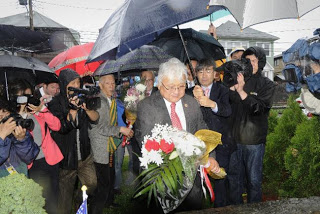 |

 |
To: Anti-Japan Chinese and Korean people
Thank you very much for your contribution to my next election campaign. I will do my best to distort the history for your ultimate goal of exterminating the Japanese. Sincerely From: Mike Honda, a snooty politician |

Prior to the Nuclear Security Summit held on March 24/25 at Prague, Prime Minister Abe stated at the Diet that the Abe Administration would preserve the Kono Statement and would neither review nor rescind Statement.After Asahi Simbun Newspaper admitted that the Yoshida Testimony was a fabrication on August 5, and the ruling LDP requested the government to issue a new statement that would substitute the Kono Statement, PM Abe stated again that he will neither revise nor withdraw the Statement.
In Japan, there is a growing criticism of keeping the Kono Statement as it is, partly due to the revelation that the Statement was the product of government-to-government compromise, not reflecting the results of hearing of 16 alleged former Korean comfort women, and partly due to the Asahi Shimbunfs admittance that the Yoshida Testimony, which is the only the offenderfs side of testimony, had been a fake.
Why does he keep stating, again and again,that he would preserve, uphold, maintain the Kono Statement ? Before he was elected again as the Prime Minister, he repeatedly stated that the Kono Statement was the curse of Japan and must be rescinded ASAP.
Today, the majority of the Japanese nationals wish to thraw the Kono Statement into a trash can. How would he respond to the wish of the majority views?
In my opinion, he is not able to do it because revision/withdrawal of the Kono Statement will have a direct impact on the U.S. Rep. Resolution 121. Considering possible resistance from the China/Korea-backed political circle in the U.S., he probably considers that Japan cannot revise/rescind the Kono Statement at all costs.
He knows that the U.S.-Japan Security Pact is the basis of peace and prosperity not only for Japan but also for the entire Asia-Pacific Region, particularly in the present situation that Japan has to face the growing threat of Chinafs military adventurism.
In this respect, the Author is quite indignant that the Obama Administration is trying to keep South Korea in our alliance at the expense of Japan. It is obvious that PM Abe said of his intention of preserving the Kono Statement at the Diet just prior to the Nuclear Security Summit at Plague because South Korean President Park insisted that Japanfs upholding the Kono Statement was the precondition of meeting PM Abe.
About a half year later, as of today, S. Korea still retains the same stance. The S. Korean government repeatedly states that gWithout Japanfs showing sincere attitude towards the issue of the comfort women, there should not be a summit meeting between Japan and South Korea.h Sincere attitude? In Japan, such words are only used by Yakuza gangs or thugs! As there is no limit of demanding something for "showing sincere attitude," such words are only used by thugs such as car accident victims who keep demanding an unlimited amount of compensation.
The Author believes that the South Korean diplomacy is crazy beyond imagination. Is comfort women issue the utmost priority for South Korea? Is it more important than the security alliance/economic cooperation with Japan and/or the United States?
Frankly speaking, almost all the Japanese are sick of Koreans. We have never thought of S. Korea as a fee democracy. S. Korea is an ancient society under the mask of a modern nation. It has been and still is the vassal state of China.
S. Koreans are the Japan hater No.1 even after 70 years have passed since WWII, although Koreans have fought with Japan like Austria to Germany, They are building comfort women memorials all over the U.S. in its persistent attempt of smear campaign againt Japan with baseless slander engraved in the metal plaques to perpetually humiliate us.
The author considers that the Japanese cannot share the same sky with the Koreans. The United States has to choose either Japan or S. Korea as its military/economic partner in the Asia-Pacific region. There should be no appeasement, no compromise, no pretending to be a good guy in keeping the honor of our ancestors.
However, the author is a layman and the Prime Minister bears the responsibiliy that comes with the position and has different views. Inasmuch as the Obama Administration strongly sticks to the rosy (and empty) idea that Japan, South Korea and the U.S. should formulate a three-party alliance of gWestern Democracyh in order to face dictatorial China, there is no way for PM Abe to say something against his personal brief.
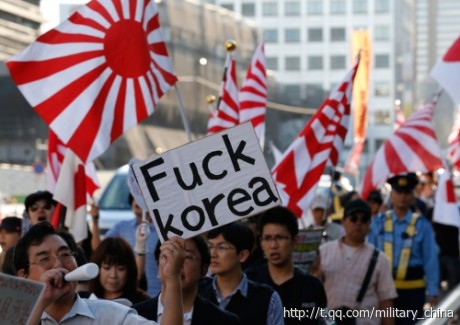 |
Japanese young people demonstrate in the central district of Tokyo to express their anger against Korea. Like looking into a mirror, hatred of Koreans towards Japan reflects upon Japanese ethnic sentiment towards Korea. |  |
Statistics show that the number of Japanese tourists visiting S. Korea dropped 20% in 1014 compared to that of 2013. The year-on-year investment of Japanese companies in S. Korea dropped 40% in 2014. The YEN-WON swap will come to zero by February 2015.
Japan is the source of advanced technology for S. Korea while China is fast catching-up Korean industry as typically seen in such areas as smart-phones and automobiles. The author trusts that unless S. Koreans stop Japan bashing addiction immediately, S. Korea will have no future. |
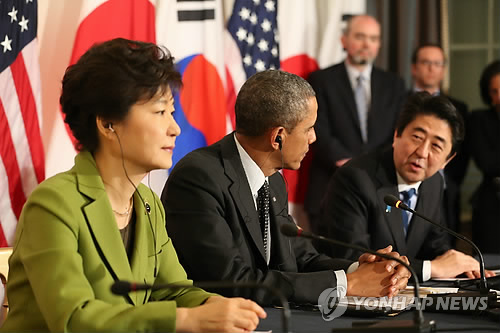
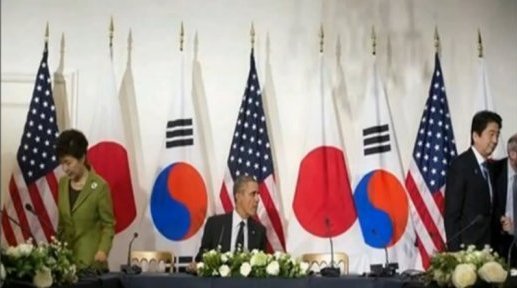
-
These photos represent the current chilly relationships between Japan and S. Korea, and the US trying to play the role of a conciliator in between.
- 1992 Kato Statement was created based on the thorough investigation the government conducted at that time. The result of our findings was that the Japanese Military and/or Authority were involved in the operation of the comfort stations to the extent as expressed in the 1992 Kato Statement.
- However, S. Korea repeatedly asked us to issue another statement that acknowledges some coercion was involved in the process of recruitment.
- Both sides agreed that we should not be stuck to this issue indefinitely. Korean side said by issuing the Statement that recognizes there were women recruited against their will, they can put an end to this dispute and seek future-oriented relationship with Japan. We believed it and delivered the Statement.
- No effort of investigation was made to find out the evidence to back up the validity of statements of 16 alleged former comfort women. The draft of the Statement was prepared jointly by both governments of Japan and S. Korea prior to the hearing of the 16 comfort women. The hearing was performed only as a formality.
- During the preparation process of the draft, S. Korea stated that 1) the Statement must be prepared in a manner acceptable to the Korean people; 2) if Japan uses such restrictive expressions as gthere was involvement of coerciveness in some casesh in the Statement, it would trigger a public furor; 3) amendments must be made in line with the request of S. Korea subject to the consent of Japan, but without such amendments, S. Korea is gunable to positively respond toh the Japanfs effort of the draft preparation.
- In response, Mr. Ishihara, Deputy Chief Cabinet Secretary of Japan, replied that as no evidence of coercive recruitment had been found out as the result of internal investigation, gwe cannot distort history. We are unable to admit unconditionally that all comfort women were recruited with coerciveness.h
- After the exchange of proposal and counter-proposal as to the proper wording of gcoercive recruitement,h both governments agreed to the compromise that ggenerally against their willh be included in the Statement.
- The draft of the Statement was sent to President Kim Young-sam for approval on August 3, one day before the release of the Statement.
- The government of S. Korea stated repeatedly that it would not seek monetary compensation.
While Japan's Prime Minister Abe is speaking to South Korean President Park Geun-hye friendly in his poor Korean language, she does not see PM Abe's face looking straight to the front just ingnoring him. Many Japanese people thought this is unusually rude. Probably, she constantly demands Japan to admit gthe past sinh because she needs to appeal her hard stand to radical anti-Japan group within South Korea.
Although PM Abe attended the conference in order to save President Obama' face, in reality he is disgruntled because he had to say in the previous Diet Meeting that he had no intention to revise the Kono Statement (probably he had to say so due to the pressure of the US to keep it).
Today, the Comfort Women Issue has become a powerful tool for South Korea to make a gholy warh against Japan.
Before 1993 Kono Statement, there was 1992 Kato Statement. As to the reason why the 1992 Kato Statement was released by then Chief Cabinet Secretary Koiich Kato, Government Investigation Committee on Kono Statement says as follows in its June 20 Report.
gAfter the first former comfort woman came forward in S. Korea on August 14,1991, three former comfort woman filed a lawsuit with the Tokyo District Court on December 6 of the same year. Amid growing interest in the comfort women issue and mounting anti-Japanese criticism in S. Korea, diplomatic authorities of both sides became concerned that the comfort women issue would surface as a pending dispute remaining unsolved during the PM Miyazawafs visit to S. Korea. PM Miyazawa was scheduled to visit Seoul on January 16.
On a number of occasions from December 1991, the diplomatic authority of S. Korea conveyed its view that it would be desirable for the Japanese-side counterpart to take some action to prevent the issue from causing friction between the two countries in advance of his visit to S. Korea. One idea S. Korea suggested was that the Japanese government issues a Cabinet Secretary Statement demonstrating its official remorse for the plight of the women.h
(The author changed some wording of the Provisional English Translation of the June 20 Report for better understanding.)
The "first former comfort woman who came forward" was Kim Hak-soon. She filed a lawsuit with Tokyo District Court along with other two women.
Kim Hak-soon, the first woman who made a public statement that she was forced to serve as a Comfort Woman, admitted she had been sold for 40 yen to a Kisaeng House, a traditional Korean school to train girls to be entertainers/prostitutes after filing a lawsuit in Japan. Koiichi Kato 1992 Kato Statement admitted that the Japanese Government involved in: supervision on installation, building and extension of structures of the comfort stations; administration of personnel engaged in recruitment of comfort women: occupational health and sanitary conditions of the comfort women and comfort stations; issuing of identification cards for personnel pertaining to the comfort stations.
1993 Kono Statement Nobuo Ishihara, former Deputy Cabinet Secretary, was the working-level top official when 1993 Kono Statement was issued. On April 2, he made important remarks as to the reason why the Kono Statement was issued at the Upper House Diet Session. In essence, he said as follows.
Unsworn Testimony by Nobuo Ishihara at Upper House Diet June 20 Report of the Government Investigation Committee on Kono Statement verifies the correctness of his remarks. Major points of the Report are as follows.
Yohei Kono So the squeaky wheel gets the grease.
After 1992 Kato Statement was issued, S. Korean diplomatic authority kept complaining and grumbling, and sucessfully made Japan to admit forcible recruitment for "the future-oriented relationship."
What a foolish political concession the top government officials of the time had made!! It was like you are confined in a torture room where you are put under the barrage of verbal abuse all the time and admitted the crime you have not committed. Stupid!
Looking back, S. Koreans as well as UN/US Japan bashers had used the Kono Statement again and again as the evidence of forcible recruitment since then. Whatever the experts describe or explain the historical facts relating to the comfort women, Japan bashers such as Mike Honda say, gThen why Kono Statement? Your government officially apologized for the forcible recruitment, isnft it?h History has been used as diplomatic manipulation and there was no future-oriented relationship.
Japan was trapped by the despicable treachery of Koreans. Japan should rescind 1993 Kono Statement right away.
Mr. Kono! You should go to the Diet voluntarily and testify that you had done a very stupid thing! Otherwise, your name will remain in the history of Japan as a traitor.
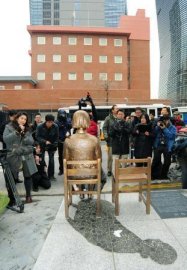 |
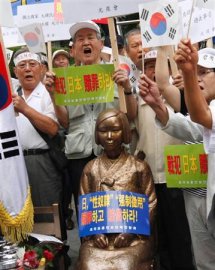 |
Despite 1965 bilateral treaty, which finalized all issues related to the Annexation Era, and 1993 Kono Statement, a political deal to put an end to the Comfort Women Issue, Korean anti-Japan activists placed the statue just in front of the Japanese Embassy in Seoul on December 11, 2011, shouting for "apology and compensation" in violation of Article 22 of the Vienna Convention on Diplomatic Relations, which gimposes the receiving state a special duty to protect the premises against intrusion, damage, disturbance of the peace or infringement of dignity.h |
|
|
To the top of this page |
|
|
Return to Home |

